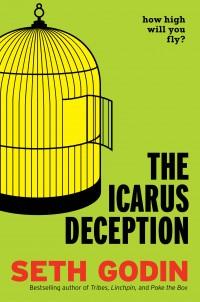 Radio Ink recently posted an interview with Seth Godin centered on his new book, The Icarus Deception.
Radio Ink recently posted an interview with Seth Godin centered on his new book, The Icarus Deception.
Greater Media’s Buzz Knight happily took on the interviewing chores, and I encourage you to spend a few minutes and hear it for yourself. Seth talks candidly about radio’s future, and a myriad of topics that focus on branding and positioning.
But he notes in the interview, managing perceptions about a radio station’s brand has more to do with how you choose to behave and interact with fans, rather than the old school idea of controlling what consumers think about you.
As Seth notes, “The Internet’s smarter than you.”
Buzz jumped into Seth’s Six Daily Habits for Artists, an area where radio can focus its efforts in order to survive and thrive. As Seth notes, copying a successful format or playing big hits are yesterday’s radio’s strategy, based on scarcity of bandwidth. Today, anyone can do radio in their basement or from their cubicle.
So how will radio be successful in a world where there’s a myriad of outlets, platforms, and opportunities for anyone to become a broadcaster?
From both a management standpoint and the POV from the air studio, it is about encouraging personalities to take risks and fail. And Seth’s regiment for artists may strike you as unconventional, but they are packed with great advice and food for thought:
- Sit alone; sit quietly
- Learn something new without any apparent practical benefit
- Ask individuals for bold feedback; ignore what you hear from the crowd
- Spend time encouraging other artists
- Teach, with the intent of making change
- Ship something that you created
 In Seth’s mind, the driving question for personalities to answer is this:
In Seth’s mind, the driving question for personalities to answer is this:
“How can I matter more to someone?”
And note that he isn’t talking about reaching a mass audience, but about making a difference to an individual. We touched on this last week in our “Fans First” post, too. Radio personalities need to take risks, try new things, and be prepared to fail. And then repeat the process.
In our PPM, week to week world, it is too easy to simply keep doing the same thing – or doing what the other guy is doing – rather than standing out, being remarkable, and making a difference in someone’s life.
It seems counter-intuitive because we now think of media and entertainment as global. We recognize that people in Des Moines or Denmark have the same access to the same resources as those who live in high-flying mega cities like New York or L.A.
And yet, touching someone, making a difference, giving someone a story to tell are all part of how success can be had in our shifting media culture.
Seth’s advice has nothing to do with prepping more or economy of words or benchmarking.
It has everything to do with looking inside yourself, connecting with others, stepping outside your comfort zone, and taking chances. Along the way, failure is inevitable.
Broadcast companies, executives, and consultants need to back up those risks and let personalities fail.
What can you do to matter more – to someone?
- What To Do If Your Radio Station Goes Through A Midlife Crisis - April 25, 2025
- A 2020 Lesson?It Could All Be Gone In A Flash - April 24, 2025
- How AI Can Give Radio Personalities More…PERSONALITY - April 23, 2025




Last week I had the rare opportunity to dine with Bob Green, the legendary WKNR air personality and program director. We found a quiet corner in a Houston restaurant and caught up on each other’s families and adventures during the last year.
Then the conversation turned to radio. Every minute I spend with Bob is a lesson from the master. As I read your post this morning, it occurred to me that “Everything Old is New Again”. All of the ideas you discussed in this post, at one time or another, were part of the WKNR playbook.
What Bob calls, “intelligent flexibility” rewarded creativity. Gary Stevens’ WollyBurger, J. Michael Wilson’s Rodney the Rodent. Scott Regen’s Melissa Mulch and the parade of characters that Tom Ryan created for Dick Purtan. All of these ideas were the creations of these artists. Scott Regen got “The Burger Club” and “The Groove Yard” ideas directly from listeners and implemented them almost immediately. When the Beatles and the Monkees came to town, Keener was the brand most associated with their appearances. And Scott Regen’s connections with Motown are legendary. That’s him saying, “This is the police…” on R. Dean Taylor’s “Indiana Wants Me”.
There is a famous Bob Green air check where he stopped the show to talk a kid into staying in school (on the air) when the listener called to make a request. Bob ran into that person at a recent radio reunion. He’s now a CEO.
Some things didn’t work. Keener’s “Vote For Your Favorite School Principal” backfired big time. But the man behind the curtain, Frank Maruca, was a buffer between the artists and station manager, Walter Paterson, an old school guy who didn’t get the vibe that was going on. And the team was allowed to innovate.
The result was a listener perception of a close, personal relationship with people who informed, entertained and cared about us. People who knew their subject cold. People who were in a constant state of experimentation. People who adjusted the format, sometimes on the fly, to attend to what the listener needed right now.
That does not exist today. With a few notable exceptions, my kids see broadcasting is nothing more than an iPod rotation with 18 minutes of commercials an hour. There is now a generation who don’t have the tradition of listening to terrestrial radio and as it becomes easier to connect smart devices to the dashboard, Pandora, Spotify and ITunes will have the wide side of the field. Despite the industry hype, most broadcasters won’t.
You’ve done a great job of articulating the path to redemption. It’s about the people. Radio needs to engage where they are – read: mobile, blogs, facebook, apps, and most importantly, in person. Radio needs listen to their customers what and provide it in a hyper local, interactive, personal way. There is no incentive to do this when there are virtual market monopolies/duopolies who prioritize shareholder return over entrepreneurial risk. When you have a personnel blood bath every Christmas, it’s a sign that you have lost your mojo.
Jobs understood this. So do Zuckerberg and Westergren. Our guys are riding the dinosaur into the tar pits.
There are some smart people who head these broadcasting companies. They craft cogent arguments for the decisions they make. They believe they have the formula for survival figured out. An unsinkable medium that will continue to deliver customers to the bank.
The guy who designed the Titanic thought he had the formula, too.
I changed barbers recently. These guys have been cutting hair for 30 years and grew up here. About 5 minutes in to my first clipping, one of them made the connection that I “used to be on WVIC”.
“We came to see you at Roller World,” he said. “You spoke at our school. I still have an album you signed. My daughter is on the radio at Olivet College and uses the same sign-off you used to use. I taught it to her.”
I haven’t been on the air regularly in over 20 years.
“Touching someone, making a difference, giving someone a story to tell,” This is what friends do. Radio still has the ability to be that friend, to inspire, even mentor listeners, developing lifelong connections along the way… if they can figure out how to matter more.
This is great stuff, Scott, And wonderfully told. Thanks so much for sharing with our readers and thanks for taking the time.
Thanks for posting this Fred. I love reading your blog and I love reading Seth. I’m listening to the interview between Buzz and Seth now. To steal an idea from Seth, some people in radio seem hell bent on industrializing radio and making it a race to the bottom. I need to think about that some more. I was challenged by his thought that radio is on the precipice of either becoming something the founders never imagined or disappearing.
Thanks, Bill. As always, Seth was definitive about his vision for radio and indeed he is challenging us to reinvent or face obsolescence. Your role as teacher is especially valuable because you’re meeting future professionals at a formative stage. Harnessing that enthusiasm and innovation are qualities that will help radio survive, adapt, and flourish. Thanks for taking the time to read our blog and to comment.